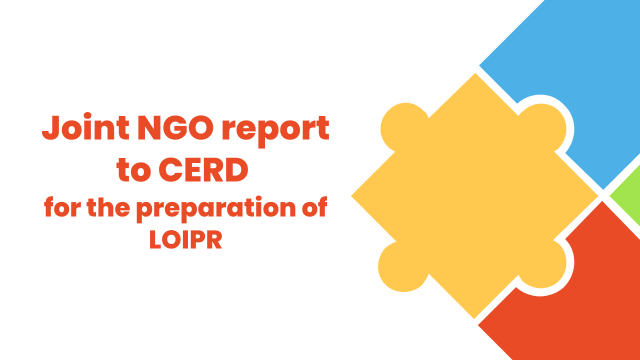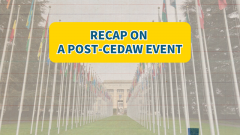Accountability and enforced disappearances in Sri Lanka (HRC48, 2021, Joint-OS)
September 16, 2021
IMADR delivered the joint oral statement on “Accountability and enforced disappearances in Sri Lanka” at the 48th session of the Human Rights Council. Whole text can be read below or download here. ![]()
———
Joint Oral Statement: 48th session of the Human Rights Council
Item 3: Interactive dialogue with the Special Rapporteur on the promotion of truth, justice, reparation and guarantees of non-recurrence
16 September 2021
Madam President,
We thank the Special Rapporteur for presenting the follow-up report on Sri Lanka. The response of the Government of Sri Lanka (GoSL) fails to share a concrete action plan to address the challenges identified by the Special Rapporteur. Almost all the activities of the Office on Missing Persons (OMP) described in the response were implemented by former Commissioners who completed their mandate in February this year. The word ‘transitional justice’ is no longer in the vocabulary of the government and we note trends towards reversing the process under the current administration.
We affirm the need to have independent mechanisms to seek truth, justice, and reparations. This is not possible in Sri Lanka today with the removal of an independent nomination and appointment process for such mechanisms. The rejection of Resolution 30/1 and the appointment of Commissioners handpicked by the President to the OMP has given rise to fear and suspicion among the victims who are seeking redress for grave violations. Moreover, no information about new OMP Commissioners is available on its website[1] at the time this statement is recorded. Victims are unable to contact the OMP while the payment of interim relief to victim families has stopped along with the issuance of Certificates of Absence. Based on recent comments made on the International Day of the Disappeared, the Office seems intent on reducing the case load rather than seeking out the truth around the circumstances in which people have disappeared and fulfilling its mandate. Meanwhile, the former Foreign Minister Dinesh Gunawardena stated last month that hundreds of those disappeared during the armed conflict were living abroad, without providing any evidence, and the Minister requested information from countries based on the lists of missing persons compiled by the OMP.[2] Such actions raise a serious concern to the safety and security of families of the disappeared who have engaged with the OMP.
Shrinking civil society space, arbitrary detention under the draconian Prevention of Terrorism Act (PTA), the militarisation of civilian administrative functions of the government and the total disregard of minority rights during the COVID-19 pandemic require serious attention from the international community. Despite its assertion to cooperate with UN human rights mechanisms, Sri Lanka has failed to submit its initial report to the UN Committee on Enforced Disappearances (CED) since its ratification in 2016.
Recommendations of the Presidential Commissions of Inquiry on “political victimisation” and Easter Sunday attacks have raised serious doubts in relation to accountability. Against this backdrop, we call on the Special Rapporteur and this Council to extend full support for the implementation of Resolution 46/1.
Thank you.
[1] http://www.ompsrilanka.org/about/profiles-of-the-commissioners
[2] https://island.lk/large-number-of-lankans-listed-as-missing-are-living-abroad-under-different-names-fm/





